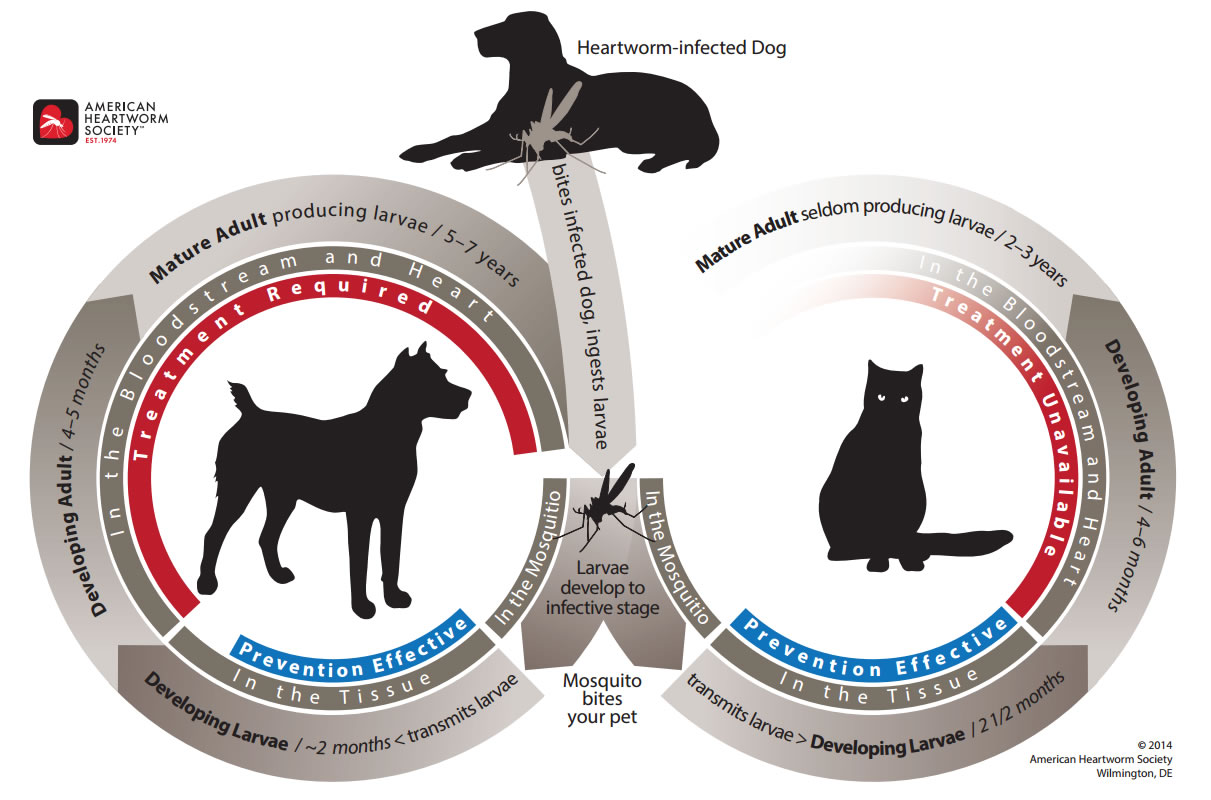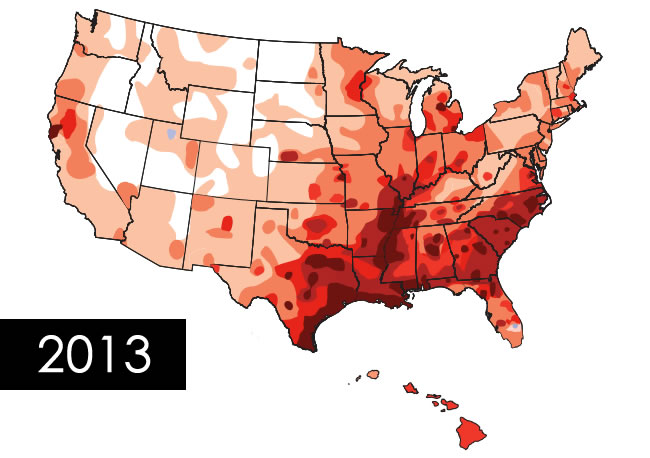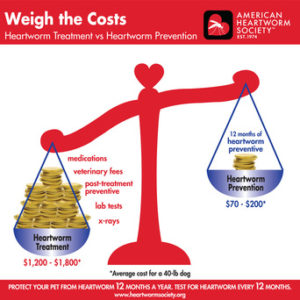 How do monthly heartworm preventives work?
How do monthly heartworm preventives work?
Whether the preventive you choose is given as a pill, a spot-on topical medication or as an injection, all approved heartworm medications work by eliminating the immature (larval) stages of the heartworm parasite. This includes the infective heartworm larvae deposited by the mosquito as well as the following larval stage that develops inside the animal. Unfortunately, in as little as 51 days, immature heartworm larvae can molt into an adult stage, which cannot be effectively eliminated by preventives. Because heartworms must be eliminated before they reach this adult stage, it is extremely important that heartworm preventives be administered strictly on schedule (monthly for oral and topical products and every 6 months for the injectable). Administering prevention late can allow immature larvae to molt into the adult stage, which is poorly prevented.
When do I start my dog on heartworm prevention?
The risk of puppies getting heartworm disease is equal to that of adult pets. The American Heartworm Society recommends that puppies be started on a heartworm preventive as early as the product label allows, and no later than 8 weeks of age.
The dosage of a heartworm medication is based on body weight, not age. Puppies grow rapidly in their first months of life, and the rate of growth—especially in dogs—varies widely from one breed to another. That means a young animal can gain enough weight to bump it from one dosage range to the next within a matter of weeks. Ask your veterinarian for advice about anticipating when a dosage change will be needed. If your pet is on a monthly preventive, you may want to buy just one or two doses at a time if a dosage change is anticipated (note that there is a sustained-release injectable preventive available for dogs 6 months of age or older). Also make sure to bring your pet in for every scheduled well-puppy exam, so that you stay on top of all health issues, including heartworm protection. Confirm that you are giving the right heartworm preventive dosage by having your pet weighed at every visit.
Do I need a prescription for my pet’s heartworm preventive medication? If so, why?
Yes. The U.S. Food and Drug Administration (FDA) labeling on heartworm preventives states that the medication is to be used by or on the order of a licensed veterinarian. This means heartworm preventives must be purchased from your veterinarian or with a prescription through a pet pharmacy Prior to prescribing a heartworm preventive, the veterinarian typically performs a heartworm test to make sure your pet doesn’t already have adult heartworms, as giving preventives can lead to rare but possibly severe reactions that could be harmful or even fatal. It is not necessary to test very young puppies or kittens prior to starting preventives since it takes approximately 6 months for heartworms to develop to adulthood. If the heartworm testing is negative, prevention medication is prescribed.
Is there an effective natural prevention for heartworm?
Only heartworm prevention products that are tested and proven effective by the U.S. Food and Drug Administration (FDA) should be used.
Is there a vaccine for heartworm disease?
No. At this time, there is not a commercially available vaccine for the prevention of heartworm disease in dogs or cats. However, research scientists are looking at this possibility. Right now, heartworm disease can only be prevented through the regular and appropriate use of preventive medications, which are prescribed by your veterinarian. These medications are available as a once-a-month chewable, a once-a-month topical, and a twice-a-year injection. You should determine the best option for your pet by talking with your veterinarian. Many of the medications have the added benefit of preventing other parasites as well.
Are heartworms more common in certain areas of the United States?
Heartworms have been found in all 50 states, although certain areas have a higher risk of heartworm than others. Some very high-risk areas include large regions, such as near the Atlantic and Gulf coasts, and along river tributaries. Most states have “hot spots” where the heartworm infection rate is very high compared with other areas in the same state. Factors affecting the level of risk of heartworm infection include the climate (temperature, humidity), the species of mosquitoes in the area, presence of mosquito breeding areas, and presence of animal “reservoirs” (such as infected dogs, foxes or coyotes).
 I live in a northern state. How long should my dog be on heartworm prevention?
I live in a northern state. How long should my dog be on heartworm prevention?
For a variety of reasons, even in regions of the country where winters are cold, the American Heartworm Society is now recommending a year-round prevention program. Dogs have been diagnosed with heartworms in almost every county in Minnesota, and there are differences in the duration of the mosquito season from the north of the state and the south of the state. Mosquito species are constantly changing and adapting to cold climates and some species successfully overwinter indoors as well. Year-round prevention is the safest, and is recommended. Remember too that many of these products are de-worming your pet for intestinal parasites that can pose serious health risks for humans.
What causes a dog to die from heartworm disease?
Heartworm disease is very complex and can affect many vital organs, including the heart, lungs, kidneys, and liver. As a result, the outcome of infection varies greatly from patient to patient. The adult worms cause inflammation of the blood vessels and can block blood flow leading to pulmonary thrombosis (clots in the lungs) and heart failure. Remember, heartworms are “foot-long” parasites and the damage they cause can be severe. Heartworm disease can also lead to liver or kidney failure. Dogs that are exposed to a large number of infective larvae at once are at great risk of sudden death due to massive numbers of developing larvae bombarding the vascular system. Other animals may live for a long time with only a few adult heartworms and show no clinical signs unless faced with an environmental change, such as an extreme increase in temperature, or another significant health problem.
The expiration date on my pet’s heartworm medication is past. Can I still use the medication?
As with all drugs or pharmaceutical products, heartworm preventives should be used before the expiration date on the package, because it is impossible to predict if it will be effective or safe. The expiration date is established by a series of tests mandated by the U.S. Food and Drug Administration to provide assurance that the product is effective and has undergone no significant deterioration.
I have missed 2 months of heartworm prevention for my dog. What should I do?
You need to consult your veterinarian, and immediately re-start your dog on monthly preventive—then retest your dog 6 months later. The reason for re-testing is that heartworms must be approximately 7 months old before the infection can be diagnosed.
(All information here was retrieved from the American Heartworm Society’s website)


 Heartworm disease is a serious and potentially fatal disease in pets in the United States and many other parts of the world. It is caused by foot-long worms (heartworms) that live in the heart, lungs and associated blood vessels of affected pets, causing severe lung disease, heart failure and damage to other organs in the body. Heartworm disease affects dogs, cats and ferrets, but heartworms also live in other mammal species, including wolves, coyotes, foxes, sea lions and—in rare instances—humans. Because wild species such as foxes and coyotes live in proximity to many urban areas, they are considered important carriers of the disease.
Heartworm disease is a serious and potentially fatal disease in pets in the United States and many other parts of the world. It is caused by foot-long worms (heartworms) that live in the heart, lungs and associated blood vessels of affected pets, causing severe lung disease, heart failure and damage to other organs in the body. Heartworm disease affects dogs, cats and ferrets, but heartworms also live in other mammal species, including wolves, coyotes, foxes, sea lions and—in rare instances—humans. Because wild species such as foxes and coyotes live in proximity to many urban areas, they are considered important carriers of the disease.

 What happens if my dog tests positive for heartworms?
What happens if my dog tests positive for heartworms?